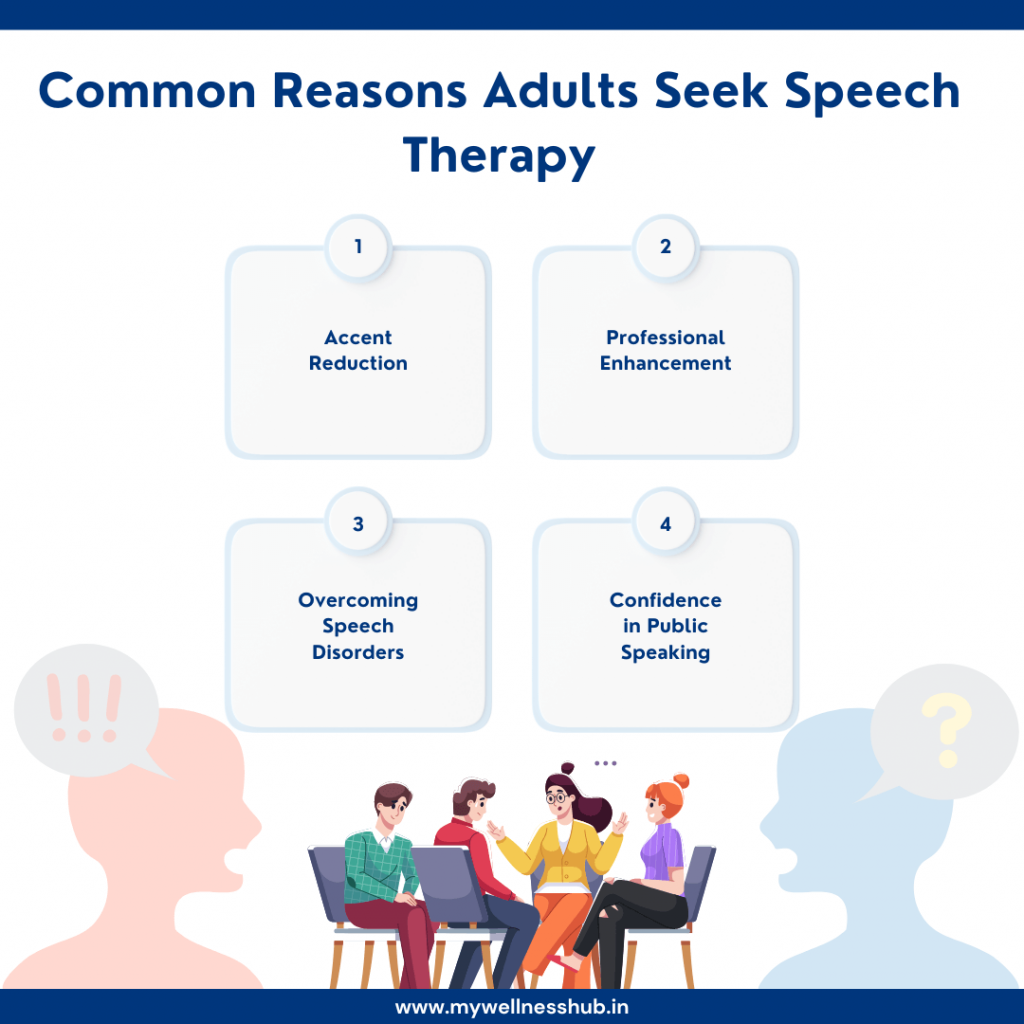Adult Speech Therapy: What Is It and How It Can Help
By Rajini D
Last Updated: April 18, 2024
Imagine not being able to articulate your thoughts or grasp others’ words. Speech is our bridge to the world, vital for sharing ideas, feelings, and engaging in everyday interactions. However, many adults find speaking a daunting challenge, due to long-term conditions or sudden medical issues, impacting their personal and professional life significantly.
When speech issues arise, they affect more than just communication—they shake confidence, hinder social connections, and limit career prospects. Feeling misunderstood or unable to comprehend can be isolating. Yet, this isn’t the end of the road. Adult speech therapy isn’t just clinical—it’s a transformative journey that reopens the doors to clear communication. Whether it’s sharpening pronunciation, conquering a stutter, or regaining speech post-injury, speech therapy is a powerful tool for empowerment, enabling individuals to live, express, and connect fully.
Also Read: Improve Speech at Home: Adult Speech Therapy Made Easy
Understanding Adult Speech Therapy
What Is Adult Speech Therapy?
At its core, adult speech therapy is a specialized form of therapy aimed at helping adults improve their communication skills. It encompasses a wide range of techniques and exercises designed to enhance speech clarity, language comprehension, and the ability to express thoughts and feelings effectively. The goals of adult speech therapy are as varied as the individuals it serves, focusing on everything from refining pronunciation to overcoming speech impediments and recovering language skills lost due to injury or illness.
A Spectrum of Benefits for Diverse Needs
Adult speech therapy is not a one-size-fits-all solution. It caters to a broad spectrum of adults, each with a unique set of challenges and objectives. For some, these difficulties have been a lifelong companion—stuttering, lisping, or difficulty articulating certain sounds. For others, the need for speech therapy emerges later in life, possibly as a result of a stroke, traumatic brain injury, or degenerative conditions like Parkinson’s disease.
Why People Seek Adult Speech Therapy

A Range of Reasons for Seeking Help
Adult speech therapy is a beacon for many, offering solutions to a wide array of communication challenges. Individuals embark on this journey for numerous reasons, each with a unique story but a common goal: to communicate more effectively. Here are some of the key reasons adults may seek speech therapy:
- Accent Reduction: For professionals working in a global environment or anyone who wishes to modify their accent, speech therapy offers techniques to enhance clarity and understandability. It’s not about losing an accent but gaining flexibility in how you communicate with others from different backgrounds.
- Professional Communication Enhancement: In the workplace, effective communication is paramount. Adults seeking to improve their public speaking and presentation skills or simply to express ideas more clearly can find valuable strategies through speech therapy.
- Overcoming Speech Disorders: For those who have lived with conditions such as stuttering, lisping, or other speech disorders, adult speech therapy provides a path to overcoming these challenges, opening up new possibilities for personal and professional interactions.
Boosting Confidence and Enhancing Skills
Beyond the mechanics of speech, therapy plays a crucial role in building confidence. Many adults find that as their communication skills improve, so does their confidence in social situations, meetings, and presentations. This newfound confidence can lead to broader social networks, improved job prospects, and a more fulfilling life.
Speech therapy is not just about speaking more clearly; it’s about understanding and being understood better. Whether it’s mastering the subtleties of intonation, learning to project your voice, or organizing your thoughts more effectively, speech therapy offers tools to enhance overall communication skills.
Also read: Unlock Benefits of Adult Speech Therapy for Better Communication.
The Process of Adult Speech Therapy
Embarking on a Personalized Journey
Embarking on adult speech therapy is a journey toward better communication, and it all starts with understanding what to expect. Central to this process is the recognition that every individual’s needs are unique. Thus, the therapy you receive is highly personalized and designed to fit your specific goals and challenges.
Step 1: The Initial Assessment
Your first step into the world of speech therapy is the initial assessment. This is where you meet with your speech therapist to discuss your communication goals and concerns. The therapist will likely conduct a series of evaluations to gauge your speech, language, and perhaps even cognitive communication skills. This comprehensive approach ensures that the therapy plan addresses all areas of need.
Step 2: Setting Goals
Following the assessment, you and your therapist will set realistic, achievable goals. These goals are your lighthouses, guiding the therapy process. Whether it’s improving fluency, enhancing clarity, or mastering professional communication skills, these objectives are tailored to reflect your personal aspirations.
Step 3: Developing a Tailored Therapy Plan
With goals in place, your therapist will develop a therapy plan customized just for you. This plan might include exercises to practice speech sounds, strategies to improve language comprehension, or techniques to enhance non-verbal communication skills. The beauty of this tailored approach is that it evolves with you. As you make progress, your therapist will adjust the plan to continue challenging and supporting you.
Practice Makes Progress
A crucial element of adult speech therapy is practice—both within sessions and outside of them. Your therapist will provide you with exercises to practice at home, reinforcing the skills learned during therapy. This consistent practice is key to making meaningful, lasting improvements in your communication.
Speech Therapy Techniques and Their Benefits
| Technique | Description | Benefits |
|---|---|---|
| Articulation Exercises | Exercises designed to improve the clarity and precision of speech sounds. | Enhances clarity of speech, making it easier for others to understand you. |
| Language Intervention Activities | Activities aimed at expanding vocabulary, improving grammar, and enhancing language comprehension. | Boosts overall language skills, enabling more effective communication in both personal and professional settings. |
| Voice Therapy | Techniques focused on improving vocal quality, pitch, and volume. | This Leads to a healthier, stronger voice that conveys messages more effectively. |
| Technology-Assisted Practice | Use of apps and software for speech practice and feedback outside of therapy sessions. | Allows for consistent practice, immediate feedback, and progress tracking, accelerating improvement. |
Know more about on our article Speech Therapy at Home: Top Tips For Parents.
Duration and Commitment
A Journey Measured in Milestones, Not Time
One of the most common questions we hear at Wellness Hub is, “How long will speech therapy take?” It’s a natural question stemming from a keen desire to communicate more effectively. However, the answer is as unique as the individuals we support. The duration of speech therapy varies significantly depending on individual needs, goals, and, importantly, commitment to the process.
Tailoring the Timeline to Your Needs
For some, speech therapy might be a relatively short journey, spanning a few weeks or months, especially if the goals are focused and specific. For others, particularly those working through longstanding speech difficulties or recovering from a medical condition, therapy may extend over a longer period. The key to remember is that progress in speech therapy is deeply personal and influenced by a variety of factors, including the complexity of the challenges being addressed and how often therapy sessions are conducted.
The Role of Commitment
Commitment to the process is vital. Think of speech therapy as learning a new instrument or acquiring a new skill—it takes practice, persistence, and patience. Your engagement, both during sessions and through practice outside of them, greatly influences the outcomes. Regular practice, active participation in therapy sessions, and a positive, committed attitude can significantly accelerate progress.
Building a Partnership for Success
At Wellness Hub, we view speech therapy as a collaborative journey. Your speech therapist is your guide, mentor, and supporter, but the strides you make together are truly a team effort. This partnership is built on mutual commitment: from our therapists dedicating themselves to providing personalized, evidence-based therapy, and from you, investing your time and effort into practicing and applying new skills.
A Note on Flexibility and Adaptability
As you progress, your therapy plan will adapt to meet your evolving needs. This flexibility is a strength of personalized therapy—it ensures that you’re always working towards achievable goals that reflect your current stage in the journey. Remember, every step forward is a victory, and every milestone reached is a testament to your commitment.
Also Read: 6 Reasons an Adult Would Need A Speech Therapist
How to Get Started with Adult Speech Therapy
Taking the First Step
Embarking on the journey of adult speech therapy can be transformative, and getting started is simpler than you might think. Here’s a step-by-step guide to beginning your journey toward clearer communication, with no special equipment required for those opting for online therapy.
Step 1: Reflect on Your Goals
Before diving in, take a moment to think about what you hope to achieve with speech therapy. Are you looking to improve your pronunciation, communicate more effectively in professional settings, or overcome a speech disorder? Having a clear idea of your goals will help you and your therapist create a plan that’s tailored just for you.
Step 2: Find a Speech Therapist
The next step is to find a qualified speech therapist who meets your needs. This is where Wellness Hub comes in. Our platform offers a comprehensive directory of experienced speech therapists specializing in adult communication challenges. You can browse profiles, read about their areas of expertise, and choose someone who aligns with your communication goals.
Step 3: Schedule a Consultation
Once you’ve selected a therapist, schedule an initial consultation. This can usually be done directly through platforms like Wellness Hub. The consultation is your opportunity to meet the therapist, discuss your goals, and get a feel for their approach to therapy.
Step 4: Begin Your Therapy Sessions
With your goals set and a therapist chosen, you’re ready to start your therapy sessions. Online therapy sessions are conducted via video call, meaning you can improve your communication skills from the comfort of your home. All you need is a stable internet connection and a device with a camera and microphone.
Step 5: Practice, Practice, Practice
Remember, progress in speech therapy comes with practice. Your therapist will provide exercises and strategies to work on between sessions. Dedication to these practices is key to achieving your communication goals.
Read more: Is Online Speech Therapy Effective? A Comprehensive Overview
Your Partner in Communication
At Wellness Hub, we’re committed to supporting you every step of the way on your journey toward clearer communication. Our platform not only connects you with qualified therapists but also provides resources and support as you navigate the world of adult speech therapy. Whether you’re looking for strategies to improve your speech, wondering about the benefits of therapy, or seeking tips for practicing at home, Wellness Hub is here for you.
Comparing In-Person and Online Speech Therapy
| Feature | In-Person Therapy | Online Therapy |
|---|---|---|
| Accessibility | Requires traveling to a therapist’s office. | Accessible from any location with internet access. |
| Flexibility | Scheduling depends on the office hours of the therapist. | Greater scheduling flexibility, including the potential for evening or weekend sessions. |
| Equipment Needed | None. Therapy takes place in the therapist’s office. | Requires a computer or tablet, a microphone, and an internet connection. |
| Personal Interaction | Direct, face-to-face communication with the therapist. | Interaction occurs via video call, which can still be very personal and effective. |
Conclusion
Adult speech therapy has so much to offer, whether you’re looking to overcome speech challenges you’ve faced for years or just want to speak more confidently at work or in your personal life. Remember, improving your communication skills is a journey that takes dedication and practice, but you don’t have to do it alone. With the right support, you can make significant progress and start enjoying deeper connections with everyone around you.
If you’re thinking about starting speech therapy or want to learn more about how it can help you, Wellness Hub is here for you. We provide easy access to experienced therapists ready to guide you toward your goals. Taking that first step might feel daunting, but it’s the most important move you can make toward unlocking your full communication potential. Visit us at Wellness Hub to find out more and take that first step today. Your voice is valuable, and it’s never too late to improve how you use it.
Frequently Asked Questions:
1. What is adult speech therapy?
Adult speech therapy is a specialized service aimed at helping individuals over the age of 18 improve their communication skills. This can include addressing speech disorders, enhancing clarity and fluency, and even accent modification.
2. Can speech therapy help adults?
Yes, speech therapy can be highly beneficial for adults. Whether dealing with long-standing speech issues, recovering from a stroke, or simply wanting to communicate more effectively in professional settings, speech therapy offers tools and techniques to improve speech and language skills.
3. How does speech therapy improve communication?
Speech therapy improves communication by addressing the specific needs of the individual, such as articulation difficulties, language comprehension, voice projection, and public speaking confidence. Therapists use a variety of exercises and strategies tailored to each person’s goals.
4. What techniques are used in adult speech therapy?
Techniques can vary widely but often include articulation exercises, language intervention activities, voice therapy, and practical communication scenarios. The therapy might also involve technology-assisted exercises for at-home practice.
5. How long does adult speech therapy take to work?
The duration of speech therapy varies depending on the individual’s goals, the complexity of their needs, and their commitment to practice. Progress can be seen in a matter of weeks for some, while others may need longer-term support.
6. Can I do speech therapy at home?
Yes, many speech therapists provide exercises and strategies that can be practiced at home. Additionally, online speech therapy options allow individuals to work with therapists remotely, making it easier to fit sessions into a busy schedule.
7. How do I start with adult speech therapy?
Starting speech therapy involves finding a qualified speech therapist, discussing your communication goals, and undergoing an initial assessment to tailor the therapy to your needs. Wellness Hub offers a platform to connect with experienced speech therapists tailored to adult communication challenges.
8. Why choose Wellness Hub for adult speech therapy?
Wellness Hub specializes in connecting individuals with professional speech therapists experienced in addressing adult communication challenges. With an easy-to-navigate platform, Wellness Hub makes it simple to find the right therapist to meet your unique needs and start on the path to improved communication.
9. What are the benefits of online adult speech therapy?
Online adult speech therapy offers the convenience of accessing professional help from anywhere, eliminating the need for travel and allowing flexibility in scheduling. It provides the same personalized approach as in-person therapy, including tailored exercises and real-time feedback, making it an effective option for improving communication skills.
10. Are there exercises I can do to improve my speech and language skills?
Yes, there are many exercises designed to enhance speech and language skills. These can include tongue twisters to improve articulation, reading aloud to practice fluency and intonation, and conversation simulations to build confidence in social settings. Your speech therapist will recommend specific exercises based on your individual goals and needs, ensuring a personalized approach to your improvement.
About the Author:
Rajini Darugupally
M.Sc., Speech-Language Pathologist (9+ years of experience)
Rajini is a passionate and dedicated Speech-Language Pathologist with over 9+ years of experience, specializing in both developmental speech and language disorders in children and rehabilitation in adults. Driven by a desire to empower each individual to find their voice, Rajini brings a wealth of experience and a warm, genuine approach to therapy. Currently, at Wellness Hub, she thrives in a team environment that values innovation, compassion, and achieving results for their clients.
Book your Free Consultation Today
Parent/Caregiver Info:
Client’s Details:
* Error Message








